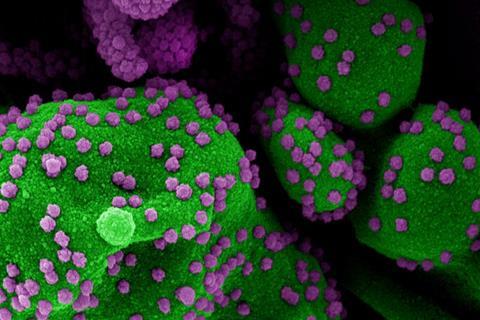New research from The Wistar Institute’s Salvino lab - led by professor Joseph Salvino, Ph.D. - has identified a novel series of SARS-CoV-2 Mpro inhibitors that may lead to potential new COVID-19 treatments that, according to preclinical testing, effectively inhibits COVID-19 and synergizes with existing anti-COVID therapies.

Their new discovery is detailed in the paper, “Design of novel and highly selective SARS-CoV-2 main protease inhibitors,” published in the journal Antimicrobial Agents and Chemotherapy.
READ MORE: Crowd-sourced potent SARS-CoV-2 antiviral lead compound announced by COVID Moonshot Consortium
READ MORE: High-throughput modular click chemistry synthesis of catechol derivatives to target Covid protease
Despite effective vaccines approved for use worldwide, COVID-19 continues to contribute to mortality and morbidity — an issue compounded by the problems of vaccine & therapy access. However, the existing drug designs in use for COVID-19 therapy lend themselves to drug interactions and the risk of incomplete viral inhibition.
To address this problem, Salvino — a medicinal chemist at Wistar — led a drug discovery team with the goal of improving upon the existing Mpro inhibitor design, an approach to viral therapy that seeks to prevent both viral replication and mutation-based drug resistance by targeting a component of the virus that regulates its ability to spread. And because Mpro is not an easy-to-mutate biological feature like a spike protein, inhibiting Mpro can help retain antiviral effectiveness even between different variations.
Drug discovery technique
The team used a drug discovery technique that applied an “acyloxymethyl ketone electrophilic warhead” — in essence, a molecule designed to identify the important binding regions that a drug candidate compound would interact with. Using their drug discovery process, Salvino and the team identified a novel series of Mpro inhibitors with greater selectivity — that is, more reliable at producing an inhibitory effect — than the existing Mpro inhibitor for COVID-19 on the market.
The group’s novel compounds successfully inhibited viral replication in vitro against three different COVID variants, including within lung tissue. The compound also synergized (i.e., achieved greater-than-the-sum-of-its-parts strength) with other existing antivirals in fighting the virus. In the preclinical testing, no apparent toxicities were observed — a positive indication of the compound’s safety.
Promising pathway
“We’re very excited to have identified such a promising new pathway for developing future therapies,” said Salvino. “As we continue to refine the chemistry through further testing and optimization, we look forward to achieving improved potency in anti-coronaviral therapies.”
Co-authors: Adi N. R. Poli, Ian Tietjen, Nitesh K. Nandwana, Joel Cassel, Troy E. Messick, Emery T. Register, Frederick Keeney, Luis J. Montaner, and Joseph M. Salvino of The Wistar Institute; and Rajesh Rajaiah, Atul K. Verma, Kabita Pandey, Arpan Acharya, and Siddappa N. Byrareddy of The University of Nebraska Medical Center.







No comments yet